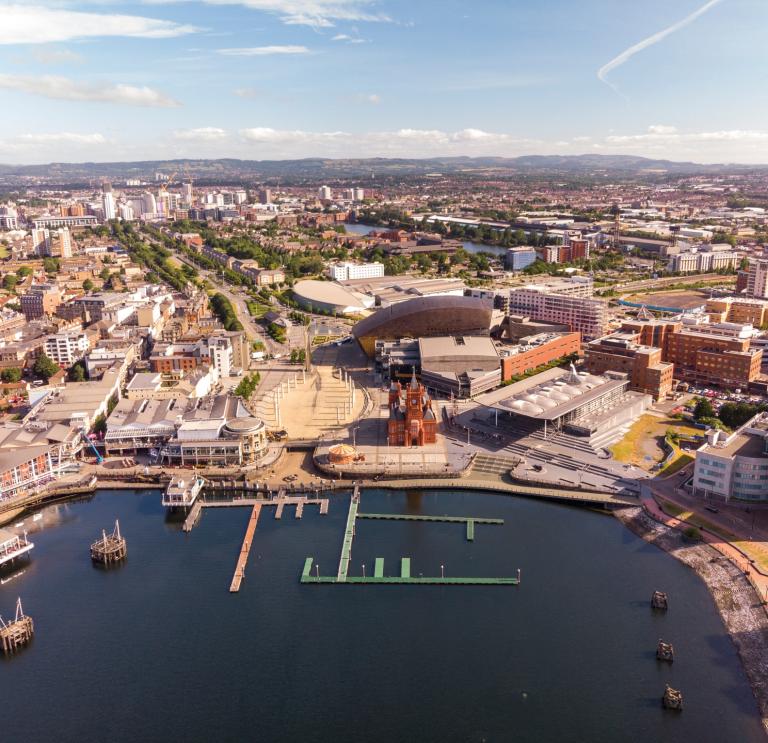What Makes Wales Mighty?
Agility Is the Secret
The first match played by Team USA at this month’s soccer world championship in Qatar is against Wales, part of the U.K. and a land of ancient castles and spectacular coastlines that takes great pride in its native culture. Off the pitch, rivalry between the two nations quickly gives way to partnership.
Wales has developed significant capabilities in important economic sectors, from fintech to renewable energy, cybersecurity, compound semiconductors and high-value manufacturing. It has done so by building clusters of expertise that see industry, academia and government co-creating high-tech ecosystems.
While Wales and the U.S. may prove evenly matched on the soccer field, they are, in terms of size, clearly very different economies. Yet the advantage of Wales’s size and structure is more agility than the larger investment locations, with close links between different parts of the economy and connections to the rest of the U.K., Europe and other parts of the world, making it an attractive investment destination.
The Welsh economy—with its rich heritage of coal mining and heavy industry such as steel-making, engineering and manufacturing—is increasingly diverse. Wales is now home to thousands of high-value manufacturing companies that together employ more than 150,000 people.
The Wales-U.S. partnership has a lot of momentum. Companies should really be asking themselves why they are not investing in Wales.
These companies operate in a variety of sectors, from aerospace, and automotive, through to power generation and infrastructure.
A particular growth area is compound semiconductors, which are crucial to expanding sectors such as electric vehicles and sustainable energy, and also used in applications including sensors and facial recognition technology. “Anything that needs high-power controls needs compound semiconductors. They take the analogue world, make sense of it and digitalize it,” says Chris Meadows, a director of CSconnected, a trade association for organizations in the sector.
“Wales identified a gap in the market for this type of semiconductor and has created an ecosystem that allows the sector to thrive. Once you have the critical mass, the infrastructure starts to form that attracts other organizations—and the talent that you want to be part of the ecosystem.”
Wales plays host to global brands including aircraft-maker Airbus and car giant Toyota, whose Deeside plant produces an engine every 44 seconds. It is also a hub for emerging innovators like “ethical hackers” PureCyber, a leading light of the country’s dynamic cybersecurity sector, and Flamgard, a manufacturer that designs fire dampers for safety-critical industries such as oil and gas, petrochemicals and nuclear, including Ukraine’s Chernobyl power station.
La-Chun Lindsay, an American engineer and ex-managing director of GE Aviation’s engine-servicing facility in Cardiff—the world’s largest—and is now one of the Welsh Government’s Envoys in the U.S., says: “It would be hard to match my passion for Wales. I’ve lived and worked in many countries and have never seen that level of support from any of those governments.
“The Wales-U.S. partnership has a lot of momentum and, as that continues to grow, more companies will catch on to how special Wales is and why it makes good business sense to partner with it. Companies should really be asking themselves why they are not investing in Wales.”
Key Investment Opportunities in Wales
Wales is developing technologies that will help shape the next century and the clean energy that will power our world. It is also nurturing the talent that will make it all happen. Here are some examples
-
Compound Semiconductors
Compound semiconductors are used in many electronics applications, from electric-vehicle chargers to autonomous vehicles, and 5G and 6G telecoms technologies. Cardiff’s world-leading Compound Semiconductor Centre aims to build a complete value chain, from world-class R&D through product and process innovation to high-value, large-scale manufacturing. “We had a vision of building a critical mass in manufacturing, research and skills development in advanced semiconductors. Our mission is to help drive the innovation agenda,” says Dr. Wyn Meredith, the center’s director. One U.S. tech company innovating in Wales is Microchip Technology Caldicot Ltd., which uses leading-edge assembly technologies to turn chips into modules.
-
Cyber
With cybercrime set to cost companies an estimated $10.5 trillion per year by 2025, the Airbus Centre of Excellence for Cybersecurity and Cryptography is fighting back. The center has been protecting the U.K. Ministry of Defence’s vast secure communications network for more than 20 years, and covers NATO systems. It also provides protection for emergency services, government, utilities, critical infrastructure, financial services sectors and more. Building on a long history of business support for cyber skills, Airbus is helping to train the next generation of cyber experts at Cardiff University and the University of South Wales, and working with locally based companies such as General Dynamics and Axiom.
-
High-Value Manufacturing
Wales has a history of heavy industry and manufacturing and is moving into high-value manufacturing, a sector that employs over 150,000. For example, Cardiff-based Space Forge is developing the world’s first returnable satellite. Andrew Bacon, co-founder and chief technology officer, says: “We’re using the space environment to make new materials that you cannot make on Earth, such as bigger crystals or the strongest metals. We bring them back down to Earth and use them to make things like more efficient aircraft turbines or better electronics for cell towers, [saving] energy and CO2.”
-
Life Sciences
CellPath makes products that help doctors diagnose and treat diseases including prostate, breast and cervical cancers. The company is constantly innovating to improve diagnoses and reduce turnaround times, working closely with the Welsh Government and universities. “We’ve had excellent support from the Welsh Government in achieving export growth, such as assistance with trade missions and attending exhibitions to promote our products. That’s been successful in helping us to increase our export sales,” says chairman Peter Webber.
-
Renewables
Wales is blessed with natural renewable resources, which attracted Minesto, a Swedish tidal energy company. North Wales, with its strong tides, well-developed port infrastructure and experienced offshore workforce, is an ideal place to develop and test the company’s innovative underwater kite. This uses the tide’s kinetic energy to create electricity and can provide clean energy in areas where no other renewable technology can operate. “Wales became the natural partnership area for us to take this technology to commercialization,” says chief executive Dr. Martin Edlund.
Why Invest in Wales?
By creating clusters of expertise in fintech, renewable energy, cybersecurity, compound semiconductors, high-value manufacturing and more, Wales is invested in helping your company achieve its goals.




